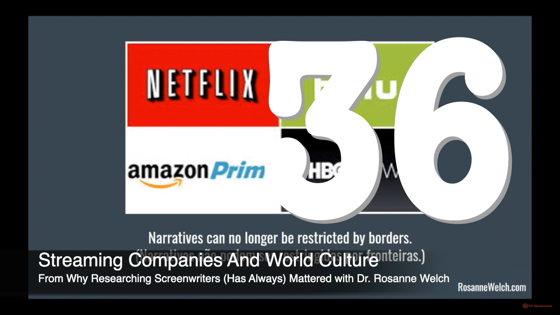Watch this entire presentation
Subscribe to Rosanne’s Channel and receive notice of each new video!
Transcript:
That’s why these services are so important to what we’re going to be able to do in the future because so many films are now co-productions with Netflix and they know they want to keep this worldwide audience because soon we’ll have the Disney streaming channel and we’re going to have an NBC streaming channel. There will be too many of those to pick from. The one thing Netflix has going for it is it’s done co-productions with so many countries. So people can have an interest in seeing their stories more than repetitive Disney stories, as much as I like Disney after a while I don’t need to see Aladdin filmed by 47 different actors again and again and again. So I think it’s really important and so even when I was preparing and thinking about doing this I watched some Brazilian television. I was able on my own television to simply dial up these programs and see what they were all about and because of that, I can then share them with my students who are very interested in finding out because my students come from many, many different backgrounds — many many different heritages and they don’t always see themselves represented on film. So the idea of seeing television shows and movies from their families home culture is a beautiful way for them to keep that culture even in a world where assimilation is the thing that more people are respecting, and they feel they lose their culture.
Watch this entire presentation
A Note About This Presentation
A clip from my keynote speech at the 10th Screenwriters´(hi)Stories Seminar for the interdisciplinary Graduation Program in “Education, Art, and History of Culture”, in Mackenzie Presbyterian University, at São Paulo, SP, Brazil, focused on the topic “Why Researching Screenwriters (has Always) Mattered.” I was especially pleased with the passion these young scholars have toward screenwriting and it’s importance in transmitting culture across the man-made borders of our world.
To understand the world we have to understand its stories and to understand the world’s stories we must understand the world’s storytellers. A century ago and longer those people would have been the novelists of any particular country but since the invention of film, the storytellers who reach the most people with their ideas and their lessons have been the screenwriters. My teaching philosophy is that: Words matter, Writers matter, and Women writers matte, r so women writers are my focus because they have been the far less researched and yet they are over half the population. We cannot tell the stories of the people until we know what stories the mothers have passed down to their children. Those are the stories that last. Now is the time to research screenwriters of all cultures and the stories they tell because people are finally recognizing the work of writers and appreciating how their favorite stories took shape on the page long before they were cast, or filmed, or edited. But also because streaming services make the stories of many cultures now available to a much wider world than ever before.
Many thanks to Glaucia Davino for the invitation.
* A portion of each sale from Amazon.com directly supports our blogs
** Many of these books may be available from your local library. Check it out!
† Available from the LA Public Library
Podcast: Play in new window | Download
Subscribe: RSS
